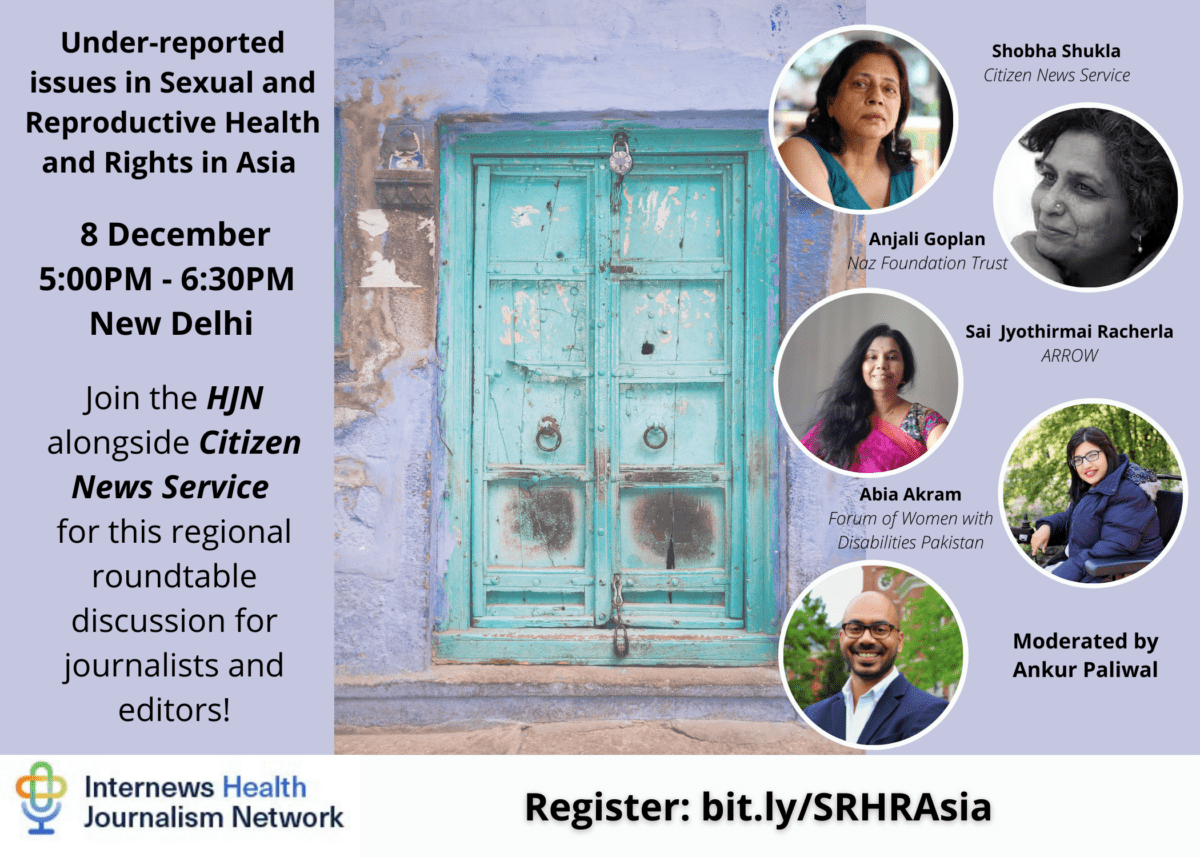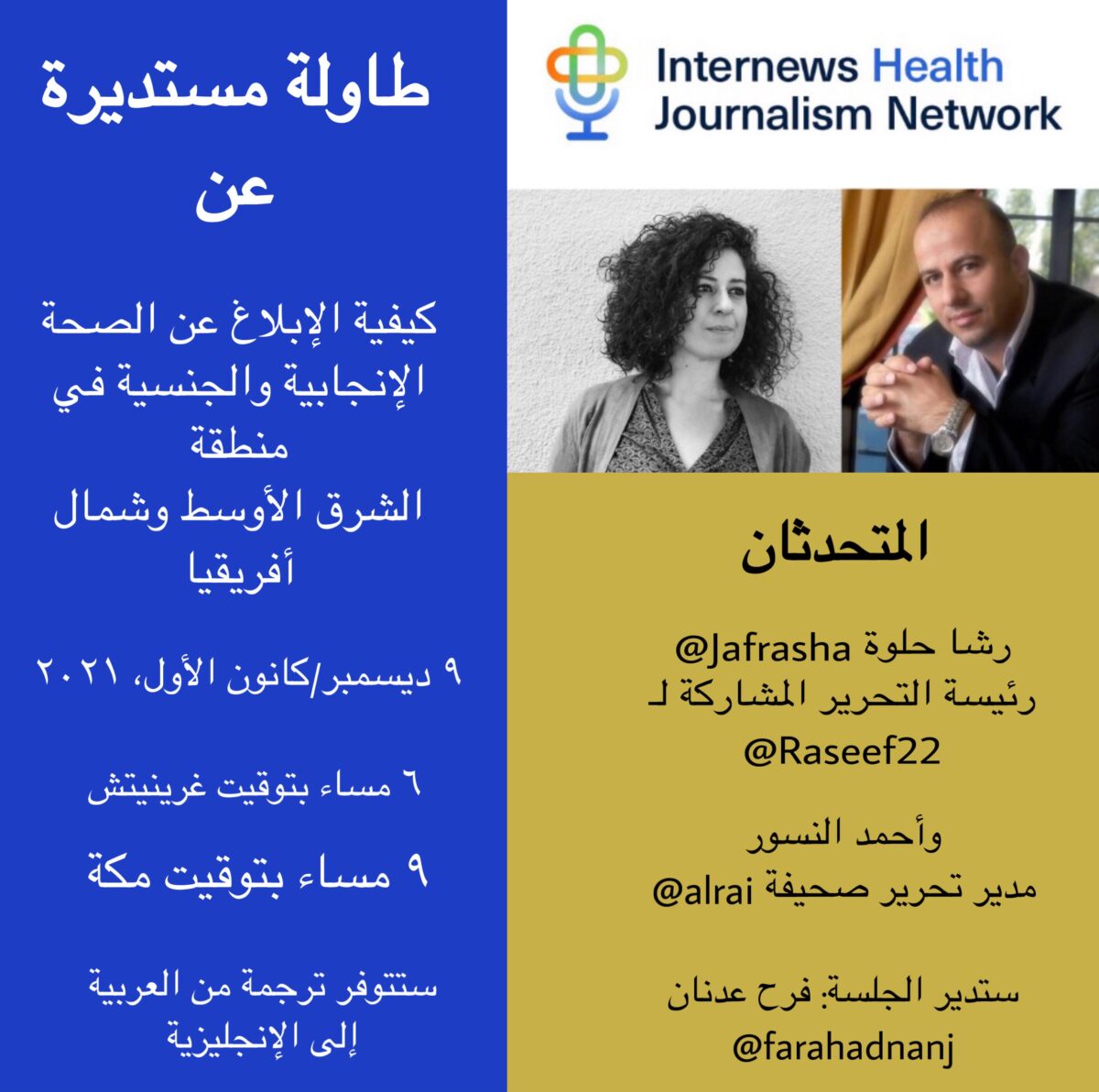Sexual and reproductive health is a state of physical, emotional, mental and social well-being in relation to all aspects of sexuality and reproduction. The comprehensive definition* of SRHR put forth in United Nations documents (notably the World Health Organization the United Nations Populations Fund) covers sexual health, sexual rights, reproductive health and reproductive rights, and reflects an emerging consensus on the services and interventions needed to address the reproductive and sexual needs of all individuals. Furthermore, it addresses issues such a violence, stigma and respect for personal body choices, which profoundly affects individuals’ psychological, emotional and social well-being. It also addresses the SRHR of neglected groups, adolescent girls, LGBTQI+, and persons with disabilities.
Throughout December, the HJN co-hosted a series of specialized roundtable discussions on reporting on SRHR with journalists and editors from different regions around the world including: Africa, Asia, Central Asia, Latin America and the Caribbean, and the Middle East and North Africa. By working with regional partners, each session featured speakers with specific expertise relevant to the region.
Africa

The Africa roundtable discussion was co-hosted by the HJN, HJN Ambassador Babatunde Okunlola, and Nigeria Health Watch, a solutions-journalism based television program that focusses on health and human rights issues. The session had many points of engagement such as: the media’s role and constraints in accurately reporting on SRHR, improving access to SRHR for marginalized/stigmatized groups such as LGBTQI and persons with disabilities, and communicating with specific social groups, such as religious leaders, to catalyse change at a community level.
Stay tuned for a blog post divulging more details about this session from our members at Nigeria Health Watch!
Asia

The Asia roundtable discussion was co-hosted by the HJN and India-based media house Citizen News Service. Sexual and Reproductive Health services in Asia are not easily accessible for people with disabilities, older women and those whose sexual orientations are not heteronormative (LGBTQIA+). At the core of these SRHR challenges lie notions of identity, choices and self-expression. These topics remain under-reported in the Asian media, so the event brought together experts on the frontlines from Pakistan, India and Malaysia, senior journalists and editors to focus on the stories that need to be told to hold governments and health care providers to account.
Central Asia
The Central Asia session was organized by founder and editor of Saglyk.org (Turkmenistan), Aynabat Yaylymova, who also serves as the HJN Ambassador for the region, along with Karlygash Kabatova, founder and editor of UyatEmes.kz (Kazakhstan). The discussion revolved around fundamental questions:
How do programs and groups work with the media in their countries? What is the role of the media and how they frame SRHR issues? How can media and programs engage and work together better? What can activists / projects do to help media cover the roots of SRHR problems and develop solution-based reporting?
Due to the sensitivity of the topics discussed and the hostile environment many reporters (and activists) covering these issues face, this event was a closed session and by invitation only.
Middle East and North Africa

The MENA session was organized by HJN Ambassador for the region, Farah Adnan, an Iraqi journalist, and featured two speakers: Rasha Hilwi, co-editor-in-chief of Raseef 22, and Ahmad Al-Nsour, managing editor of the Jordanian Al-Ra’i newspaper. The purpose of the session was to peak the interest of journalists and media outlets in the MENA region to report on issues related to sexual and reproductive health. SRHR issues in the region are often perceived as taboo and this session worked to empower journalists and editors to fight against societal misconceptions and stigma.
Adnan’s blog post about the session will be posted to the website soon!
Watch the full session in Arabic
Latin America and the Caribbean

HJN Ambassador Sinergias led the organization of this session, which focused specifically on media coverage of SRHR topics in indigenous, rural and other marginalized populations. Edilma Prada, directora de Agenda Propia, said that often the realities of indigenous communities are rarely covered in Colombian mass media also due to a lack of understanding of indigenous rights. Her organization is therefore committed to promoting intercultural dialogues with community leaders to co-create conversations that matter to marginalized communities. Sergio Silva -editor of the science, health and environment at El Espectador newspaper – agreed with the notion that SRHR topics are often neglected in mainstream media, while also reminding other panelists that the COVID-19 pandemic took over his section of the newspaper for the past two years. Bubolina Moreno, disability activist and social communicator, emphasized that the media often perpetuates negative stereotypes of person with disabilities. “When it comes to the sexual and reproductive rights of persons with disabilities – especially women – there is a tendency in the media to further disempower them by only quoting medical doctors, representatives of institutions and even family members. Rarely, are the voices and opinions of women with disabilities heard when it comes to their own sexual and reproductive rights.”
Watch the full session in Spanish
Resources
Check back here soon! We are working hard to put together the most relevant reporting resources to make your job easier!